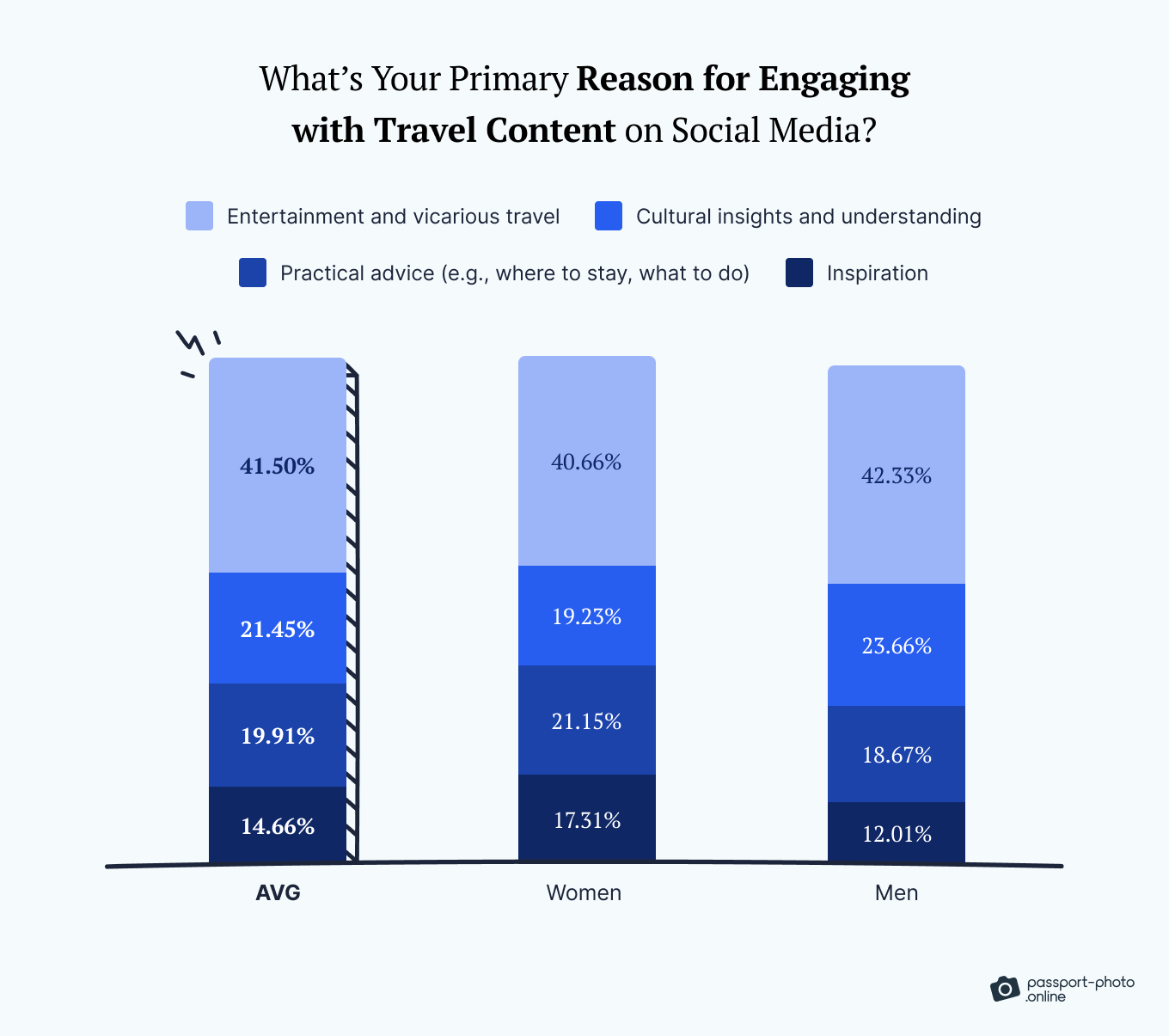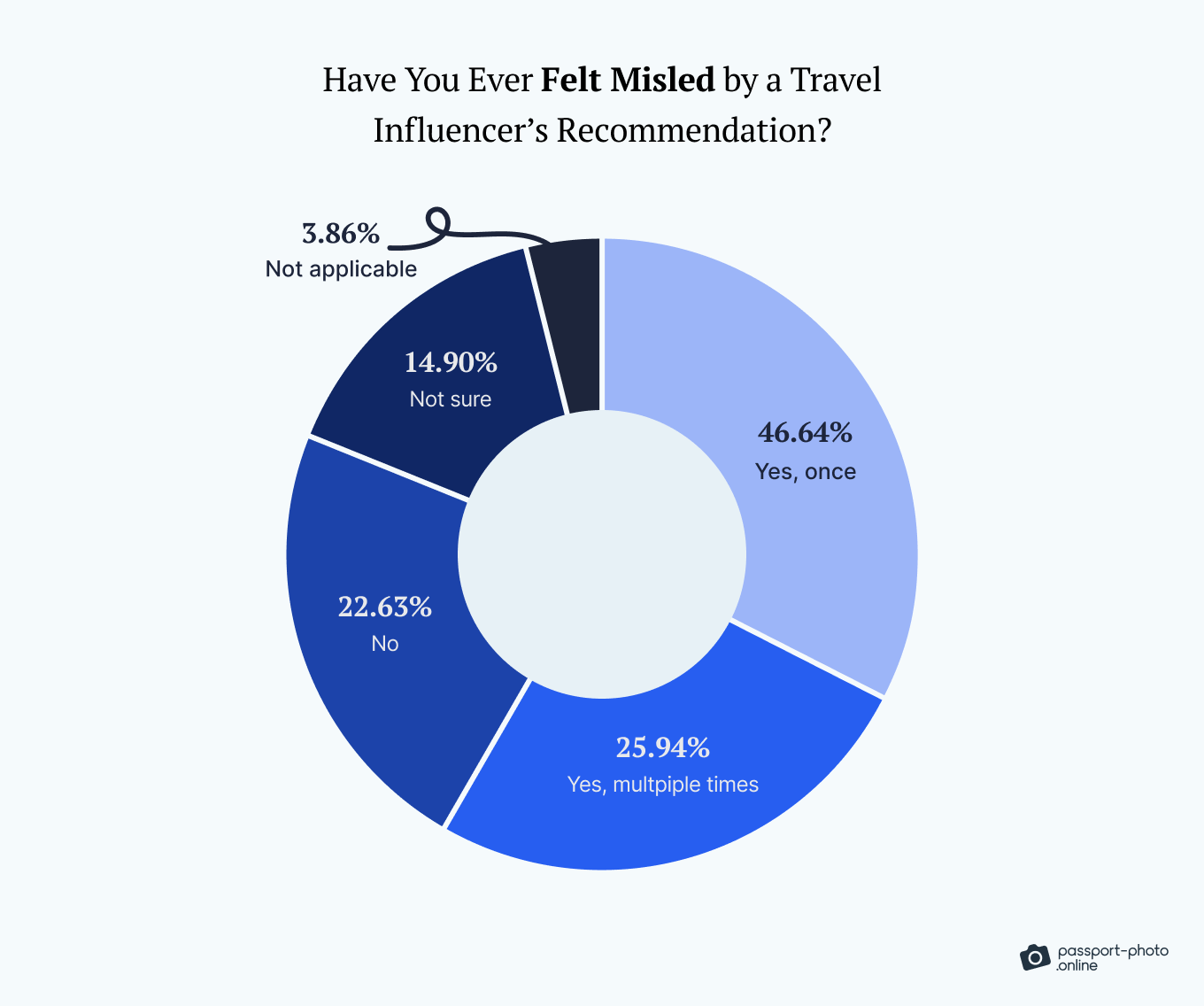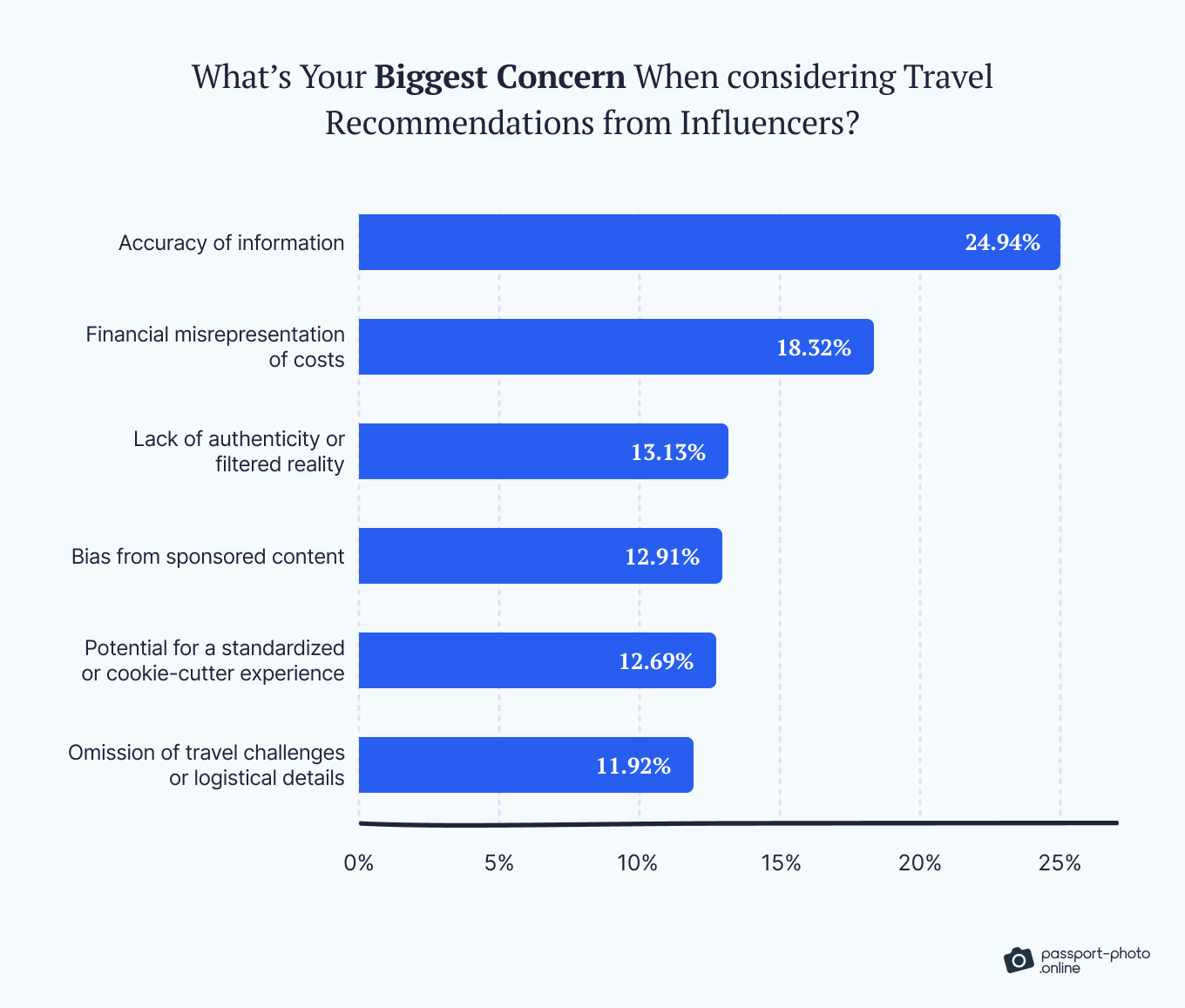Consider this:
The “travel” hashtag on TikTok has amassed over 26.3M posts and 217.8B views.
With those numbers, it’s no stretch to say that social media influencers have become the new crop of travel agents.
But—
While many provide valuable insights on destinations, attractions, and foods, this summer has seen a wave of backlash.
Take, for instance, a woman who said that some people “deserve jail time” for glossing over the Amalfi Coast’s logistical hassles.
So, we decided to reach out to 1,000+ Americans to gauge their perceptions of influencers in the context of travel advice.
Scroll down for our findings.
Key Takeaways
- Instagram (37%) was voted the most popular social media platform for travel.
- People mainly consume travel content on social for entertainment and vicarious experiences (42%).
- Most Americans (78%) admit that influencers have inspired them to visit destinations, attractions, or restaurants that weren’t originally in their plans.
- The majority of respondents (45%) trust social media creators only to some extent.
- The biggest travel recommendation concerns are information accuracy (25%), cost misrepresentation (18%), and filtered reality (13%).
- Nearly 59% of survey takers have felt misled by a blogger’s travel advice at least once.
- The best way to navigate travel tips on social media is to evaluate the source’s credibility and expertise, as suggested by 24% of respondents.
Most Engage with Travel Content for Entertainment and Vicarious Experiences
Diving straight into business, we wanted to understand where Americans typically go on social media for their travel needs.
To do it, we provided a list of popular platforms and asked survey participants to choose their preferred one.
Let’s look at the top three that made the cut:
| Which Social Media Platform Do You Primarily Use for Your Travel Needs? | Share |
|---|---|
| 36.64% | |
| YouTube | 26.05% |
| 23.4% |
As you can see, Instagram took the crown, with 37% of the vote.
But—
What drives people to seek travel content?
The results are below:

A significant 42% of respondents engage with travel content mainly for entertainment and vicarious experiences.
It’s followed by those looking for cultural insights (21%) and practical advice (20%).
A gender breakdown also reveals that ladies are more interested in actionable tips and travel inspiration. This aligns with external research, which found that women make 80% of travel decisions.
Lastly, we sought to measure content creators’ influence on our travel plans.
The numbers are in:
| Have Travel Influencers Ever Inspired You to Visit a Specific Destination, Attraction, or Restaurant That Wasn’t Originally on Your Plans? | Share |
|---|---|
| Yes | 77.92% |
| No | 9.16% |
| Not sure | 9.16% |
| Not applicable | 3.75% |
As you can see, roughly 78% of survey takers admit to being swayed by influencers, making them an influential (pun intended) force in the travel industry.
But do we have reservations over their advice or take everything as gospel?
We’ll discuss it next.
Nearly 6 in 10 Have Felt Misled by Travel Influencers at Least Once
Let’s be honest:
Not everything you see on social media is the golden ticket to your dream vacation.
Take, for instance, those intricate spreadsheets and decks on TikTok, promising “the best summer Europe trip ever.”
It’s not impossible some of them were created by those who’ve never even been to the Old World.
Indeed.
When we asked respondents if they’d ever felt duped by a blogger’s recommendation, we weren’t too surprised when 59% said, “Yes.”
Take a look:

With this in mind, we set out to explore how much trust Americans place in travel influencers’ recommendations on the whole.
Below are the results:
| How Would You Rate Your Trust in Travel Influencers’ Advice? | AVG | Gen Zers | Millennials | Gen Xers | Baby Boomers |
|---|---|---|---|---|---|
| Trust to some extent | 45.49% | 64.77% | 54.8% | 35.61% | 26.79% |
| Neutral / Neither trust nor distrust | 23.58% | 16.48% | 9.96% | 25% | 42.86% |
| Complete trust | 20.19% | 18.18% | 30.44% | 25% | 7.14% |
| Limited trust | 7.55% | 0.57% | 3.69% | 9.85% | 16.07% |
| No trust at all | 3% | 0% | 1.11% | 4.55% | 7.14% |
The data suggests that while there’s generally trust in content creators, it’s often cautious, particularly among older generations.
That brings us to our next point:
Americans’ top worries about travel advice on social platforms.

As you can see, the primary concern revolves around information accuracy (25%).
Other notable fears pertain to financial transparency (18%), authenticity (13%), and potential bias due to sponsorships (13%).
Influencers, take note!
Evaluate Creators’ Credibility and Expertise: The #1 Tip for Engaging with Travel Advice
Before we’re over and out, we want to leave you with actionable advice on navigating travel recommendations on social media responsibly.
So—
Without further ado, here’s what our survey participants suggested:
| What’s Your #1 Tip for Using Travel Advice on Social Media? | Share |
|---|---|
| Consider the source’s credibility and expertise | 24.06% |
| Cross-reference advice with other sources | 20.64% |
| Cross-reference advice with other sources | 20.53% |
| Be mindful that photos and videos might not always represent reality | 18.98% |
| Beware of sponsored content | 15.56% |
With this, it’s time to wrap.
Safe travels!
Stacking It All Up
There you have it.
A comprehensive look at the perception of social media influencers in the context of travel advice.
Now—
If you believe your audience will be interested in this information, feel free to share it. Just remember to mention the source and link back to this page.
Methodology
We conducted an online survey of 1,022 US respondents via a bespoke online polling tool in October 2023.
The respondents were 59.7% male, 40.2% female, and 0.1% identified as other. 19.4% of respondents were 26 or younger, 59.8% were aged 27–42, 14.6% were aged 43–58, and 6.2% were 59 or older.
This survey has a confidence level of 95% and a margin of error of 3%. Given the gender and age makeup of our sample size, the study’s findings are statistically significant for the population at large.
This study was created through multiple research steps, crowdsourcing, and surveying. Data scientists reviewed all survey participants’ responses for quality control. The survey also had an attention-check question.
Sources
- Forbes, “Reinventing the Travel Experience to Meet the Needs of Women”
- PhocusWire, “Influencers Are a New Class of Travel Agents — but Lack the Right Tools”
- TikTok Hashtags, “#travel Hashtags for TikTok”
- Time, “TikTok Travel Tips: Here Are the Dos and Don’ts”
- Vox, “Entitled American Tourists Expect Perfect, Optimized Vacations”

As a Digital PR specialist and a member of the Society of Professional Journalists (SPJ), Max has 5+ years of writing experience.
Over the course of his career, Max’s work has garnered significant attention, with features in numerous prominent publications such as The New York Times, Forbes, Inc., Business Insider, Fast Company, Entrepreneur, BBC, TechRepublic, Glassdoor, and G2.









